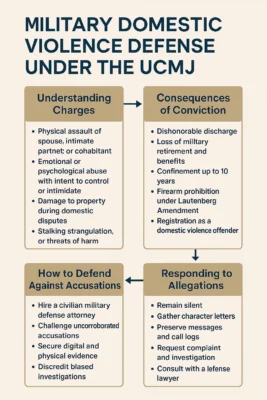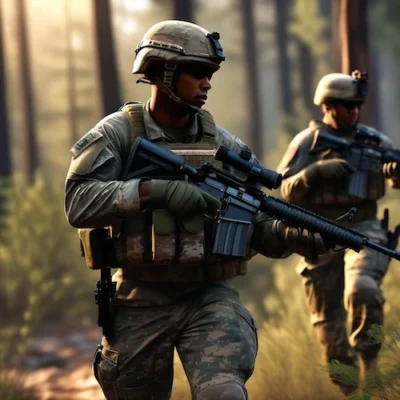Military Domestic Violence Defense Under the UCMJ
If you’re a service member facing domestic violence allegations, your rank, career, and freedom may be at risk. Immediate legal action is critical.
Understanding Domestic Violence Charges in the Military
Domestic violence in the military is prosecuted under multiple provisions of the Uniform Code of Military Justice (UCMJ), primarily Article 128b – Domestic Violence, enacted by the 2019 NDAA and updated in 2024 (Source: 10 U.S.C. § 928b).
These charges may also trigger other UCMJ articles like Article 128 (Assault), Article 134 (General Article), and Article 133 (Conduct Unbecoming, for officers).
What Constitutes Military Domestic Violence?
- Physical assault of a spouse, intimate partner, or cohabitant
- Emotional or psychological abuse with intent to control or intimidate
- Damage to property during domestic disputes
- Stalking, strangulation, or threats of harm (often added under Articles 130 and 128b)
The law applies to both male and female service members, including same-sex partnerships, and can involve acts committed on or off base.
Military vs Civilian Prosecution
While civilians face state or federal prosecution, military members may be prosecuted in court-martial, receive non-judicial punishment (NJP), or be processed for administrative separation. In some cases, the military may refer the case to civilian authorities or try both simultaneously under dual sovereignty.

The Consequences of a Domestic Violence Conviction
Service members convicted under Article 128b face severe penalties:
- Dishonorable discharge
- Loss of military retirement and benefits
- Confinement (up to 5–10 years depending on aggravating factors)
- Firearm prohibition under the Lautenberg Amendment
- Mandatory registration as a domestic violence offender (in some states)
How To Defend Against Domestic Violence Allegations in the Military
- Hire a Civilian Military Defense Attorney: JAG defense counsel are often overloaded and unable to give your case the time it needs.
- Challenge Uncorroborated Accusations: Many military domestic violence cases rely solely on the alleged victim’s statement. A skilled lawyer can expose inconsistencies, bias, and motive to fabricate.
- Secure Digital and Physical Evidence: Text messages, photos, Ring camera footage, and call logs often tell a different story.
- Discredit Biased Investigations: Many cases are investigated by Family Advocacy Program (FAP) or command-directed investigations lacking due process and neutrality.
- Prepare for Character Attacks: Expect prosecutors to use past counseling statements or unrelated conduct to argue a pattern of abuse. A strategic defense can neutralize this.
Why Are False or Exaggerated Claims So Common?
Military domestic violence allegations often arise in the context of:
- Child custody disputes
- Breakups or divorce proceedings
- Revenge for infidelity or control
- Alcohol-fueled arguments with no witnesses
- Command climate that presumes guilt
These cases are highly emotional and often lack physical evidence. This makes it vital to uncover motive and inconsistencies through cross-examination, expert testimony, and digital forensics.
Mini FAQ
Can I be convicted if there are no injuries?
Yes. Under Article 128b, physical injury is not required. Emotional harm or credible threats may suffice.
What if the alleged victim wants to drop the charges?
In military law, the command—not the victim—decides whether to pursue charges. The case may proceed regardless of retraction.
Will I lose my weapons rights?
Yes. A conviction can trigger the Lautenberg Amendment, barring firearm possession for life.
How To Respond If You’re Accused
- Remain silent. Do not talk to command, FAP, or law enforcement without a lawyer.
- Gather favorable character letters from supervisors and peers.
- Preserve all messages, videos, and call logs.
- Request a copy of the complaint and investigation.
- Consult with a defense lawyer who handles UCMJ domestic violence cases.
Command-Directed Investigations and FAP Reports
Many domestic violence allegations begin with a Family Advocacy Program (FAP) referral. These investigations are **not** neutral. They often rely on unchecked narratives, assume abuse occurred, and push for treatment—even if no crime was committed (Source: DoDI 6400.06, 2023).
Article 32 Hearings: Your First Line of Defense
These preliminary hearings are your chance to expose weak evidence, biased investigations, and questionable witnesses. While non-binding, Article 32s can shape plea deals, dismissals, or refiling decisions.
Administrative Separation vs Court-Martial
In some cases, commands opt for an **administrative separation board** instead of court-martial. Although lower in formality, the consequences—loss of benefits, discharge characterization—can still be career-ending. You still need aggressive legal defense and expert preparation.
Sentencing Strategy in Domestic Violence Trials
Even if convicted, sentencing matters. The right witnesses, rehabilitation efforts, psychological evaluations, and trial strategy can reduce confinement, preserve benefits, or allow continued service in rare cases.
References
- 10 U.S.C. § 928b (2024) – Domestic Violence under the UCMJ
- DoDI 6400.06 – Domestic Abuse Involving DoD Personnel (2023)
- Manual for Courts-Martial, 2024 Edition
- National Defense Authorization Act for FY 2019, § 552

